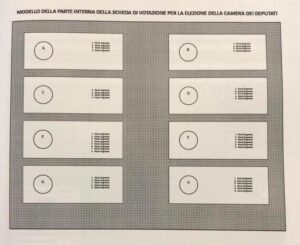Vote NO to avoid the lockdown of democracy (by P. Becchi and G. Palma)

Article by Paolo Becchi and Giuseppe Palma in Libero yesterday, 17 September 2020 (extended version):
The referendum is approaching and here we want to explain why, in our opinion, we must vote against the "cut" of parliamentarians. Of course, we are not ideologically opposed to reducing the number of parliamentarians, far from it, but this had to be done within an overall reform of the state, starting with the overcoming of equal bicameralism and the grafting of equilibrium tools such as, for example , a federal reform of the Republic and the direct election of the Head of State. But the reform on which we are going to vote on September 20 and 21 provides only for a rambling "cut" of parliamentarians, without any suitable counterweight to balance the lower popular representation in Parliament.
The reasons for the No (12 to be exact) we have highlighted them in our booklet that saw the light in mid-February ( A wrong reform ), but here we limit ourselves to summarizing the 7 main aspects :
- The costs . Di Maio says that with the "cut" we will save 300 thousand euros a day. Even if it were true, it would be a saving of around 110 million euros a year, that is one euro and eighty-three cents a year per citizen, less than an ice cream. A negligible, almost laughable saving. Just think that Minister Azzolina's useless wheeled benches will cost us about 1.3 billion euros, so more than 10 years of savings resulting from the "cut" of parliamentarians would go to bless.
- Worse than P2 . Similar to this reform is the one proposed by the Masonic lodge "propaganda 2" by Licio Gelli, which provided for an even less invasive reduction (450 deputies and 250 senators) and with corrective measures that – at least in theory – balanced the "cut", such as the direct election of the President of the Republic. Today, however, there is only a linear “cut” that sacrifices representation, done without criteria and without any counterweight.
- Risk of oligarchy . The decisions in the committee will be adopted in the Senate by sessions composed no longer of 20-25 senators as happens today, but of 10-12 senators, or even fewer. It could even go up to 6 in case of absences, with the majority approving with just 4 votes. Faced with this criticality, it was necessary to approve, before the referendum, an amendment to the parliamentary regulations, which was not done. A "cut" in the dark.
- No elected, only nominated . Pd and M5s have already adopted the basic text of the new electoral law, the brescellum , which provides for blocked price lists in the constitutional affairs committee in the Chamber . So not only with the "cut" will popular representation in Parliament be reduced, but the few remaining will not even be directly elected by the citizens, as required by the Constitution, but nominated by the party secretariats.
- An armored Senate . The art. 57 of the Constitution establishes that senators are elected on a regional basis. This means that, with a Senate of 200 members (196 those elected in Italy), the lists that will see the seats assigned will only be the most voted ones, above about 10-15%, leaving several lists outside Palazzo Madama, even if with consents exceeding the threshold of 5% envisaged by the brescellum. Furthermore, a reduction in the number of elected senators is not matched by a reduction in the number of senators for life, which remain 5, and therefore increase their specific weight.
- The Constitution in the hands of four cats . The constitutional revision procedure, dictated by Article 138 of the Constitution, provides for two different resolutions of both Chambers at a distance of not less than three months from each other. In the passages of the first resolution, the majority of those present is sufficient, in the double passage of the second resolution, at least the majority of the members of both branches of Parliament is required. This means that, with the "cut", in the second resolution, the amendments to the Charter can be approved in theory with just 302 votes in favor (201 deputies and 101 senators), while in the first even with much less.
- The comparison with other countries . If yes, we will have just 600 parliamentarians out of 60 million resident citizens, so Italy will be – with the "cut" – one of the European nations with fewer parliamentarians, one for every 100 thousand inhabitants. Today France has one in every 72 thousand, England one in every 46 thousand, Sweden one in every 29 thousand and Norway one in every 32 thousand. Only Germany would have fewer than us, that is, one for every 106 thousand inhabitants, but the Germans have a federal system where the Länder enjoy a much more incisive legislative weight than our Regions. As in the USA, where the federated states have a reserve of exclusive legislation on several matters with respect to those of the Federation, and moreover each state has a very important specific weight – with the system of Grand Electors – in the election of the President.
Basically with the "cut" of the parliamentarians, the M5s wants to fight the "caste", but in reality it becomes "caste" itself. Appointed parliamentarians who no longer answer to the people but only to the party secretariats. It will be said that this is already the case today, and in part it is also true. But falling from the pan into the fire is certainly not the solution. This is not a reform, it is just an attempt by the 5 Stars to fill the belly of an electorate that sees politics as its worst enemy. What is more, in these months of pandemic something very serious has happened that should make us think: the virus has also taken away Parliament, forced to ratify the decisions taken by the Prime Minister without even being able to amend them. Are we really sure that this is the best time to sacrifice the Chambers numerically? We believe No. Also because we do not want a new lockdown, this time of democracy.
by Paolo Becchi and Giuseppe Palma in Libero of 17 September 2020 (extended version).
*** *** ***
Below is the ELECTORAL CARD attached to the basic text of the new electoral law ( Germanicum or Brescellum if you prefer) adopted in the Constitutional Affairs Commission in the Chamber ten days ago, with the favorable votes of PD and M5S . After the referendum, the text will be examined by the Parliament. As you can see, it is a proportional (with a threshold of 5%, without prejudice to the right of the tribune) with multi-member colleges and with BLOCKED PRICE LISTS , that is, without the possibility for the voter to express preferences. The election will take place according to the order in which the candidates will be placed on the ballot by the party secretariats:
*** *** ***
PS Those who wish to deepen the reasons for the “No” to the confirmatory referendum of 20 and 21 September, will be able to read the penultimate book by Paolo Becchi and Giuseppe Palma, “ Una reform errata. Twelve reasons to say NO to the cut of parliamentarians ", Editrice Gds (first edition February 2020; second edition September 2020):
https://www.amazon.it/Una-reforma-sbagliata-Dodici-parlamentari/dp/8867829920/ref=mp_s_a_1_1?dchild=1&keywords=una+reforma+sbagliata&qid=1599220139&sr=8-1

Thanks to our Telegram channel you can stay updated on the publication of new articles of Economic Scenarios.
The article Voting NO to avoid the lockdown of democracy (by P. Becchi and G. Palma) comes from ScenariEconomici.it .
This is a machine translation of a post published on Scenari Economici at the URL https://scenarieconomici.it/votare-no-per-evitare-il-lockdown-della-democrazia-di-p-becchi-e-g-palma/ on Fri, 18 Sep 2020 14:08:33 +0000.

